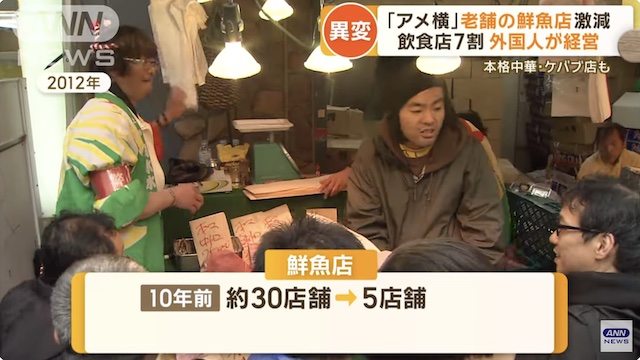TOKYO, Jun 15 (News On Japan) - Tokyo's downtown market district, Ameyoko, which attracts hundreds of thousands of shoppers, especially around New Year, is undergoing a major transformation. Traditional fresh fish stores have dwindled, while multinational restaurants have surged. What is happening?

'70% of Restaurants' Run by Foreigners
The "Ameyoko Shopping Street," spanning about 500 meters along the elevated tracks from JR Ueno Station to JR Okachimachi Station in Tokyo, is a popular spot with around 400 shops. However, a change has occurred in recent years.
The area has become home to various international restaurants, particularly Chinese ones.
At "Chuan Chuan Xiang," a shop selling authentic Chinese dishes like pig's trotters and roast chicken, tourists from Taiwan take a break.
Tourist from Taiwan: 'We came to Japan for sightseeing, but we missed Chinese food and came here to eat. The taste is just like home.'
Chuan Chuan Xiang Staff: 'Ameyoko has many foreigners, not just Japanese customers, making it easier to do business. People from Vietnam, Myanmar, Thailand, and the Philippines also buy from us.'
According to Hayato Chiba, the vice chairman of the Ameyoko Shopping Street Union, who has been selling leather goods for 33 years, the number of restaurants has increased rapidly in recent years.
Hayato Chiba: 'About a dozen years ago, the first kebab shop appeared, and I thought it was unusual. About 5 to 6 years ago, the number suddenly increased. Now, there are about 50 restaurants out of around 400 shops. There were almost none in the past.'
Of the approximately 50 restaurants, 35 are run by foreigners, making up 70%.
Fish Stores Decrease from 30 to 5 Stores
In contrast to the increasing number of restaurants, fish and dried food stores are decreasing. The bustling Ameyoko at the end of the year, with people searching for ingredients for New Year's, was a traditional scene...
Hayato Chiba: 'There used to be about 20 fish stores here. Now, there are five.'
Ten years ago, there were about 30 fish stores, but now there are only five, due to a lack of successors and the impact of COVID-19.
Kenko Mochimaru, President of Mochimaru Suisan: 'Before COVID-19, there were more than 10 stores, but since then, many have closed down. There are no successors, and some decided to quit because of the pandemic.'
As soon as a property becomes vacant, foreigners quickly rent it, transforming the area into the current multinational restaurant street.
Mochimaru, President: 'The momentum is incredible. As soon as a place becomes available, they move in.'
Focus on Traditional Retail Stores
The clientele of Ameyoko has also changed, with foreign tourists increasing about five years ago, now making up around 70% of visitors.
Tourist from Israel: 'It's a nice place, full of good ingredients like fruits, meat, and fish.'
Tourist from Mexico: 'There are many interesting shops selling fascinating items.'
With more foreign tourists unfamiliar with raw fish, the sales of surviving fish stores are declining, prompting them to consider new strategies.
Mochimaru, President: 'We are thinking of doing something besides fish, like grilling items for people to eat while walking.'
Ameyoko, rooted in the post-war black market, has evolved through the Showa, Heisei, and Reiwa eras. While accepting change, Chiba hopes people will also pay attention to the traditional retail stores that embody Ameyoko's essence.
Chiba, Vice Chairman: 'Restaurants have become essential, but as Ameyoko, a retail district, I hope people enjoy eating and drinking but also explore inside the underpass. It's a place where you can find anything except cars. It's like a treasure hunt; you always find something you want.'
Source: ANN















